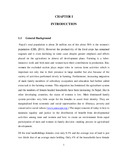Please use this identifier to cite or link to this item:
https://elibrary.tucl.edu.np/handle/123456789/2202| Title: | Contribution of Commercial Vegetable Farmingin Women's Livelihood (A Case Study of Sundarijal VDC, KathmanduDistrict, Nepal) |
| Authors: | Thapa, Shubhadra |
| Keywords: | Women's Empowerment;Genders Equality |
| Issue Date: | 2017 |
| Publisher: | Central Department of Rural Development |
| Abstract: | This research was conducted in vegetable farming of Sundarijal VDC, Kathmandudistrict. The general objective of this study is to trace out " commercial vegetable farmingand women's livelihood". Similarly, the specific objective of the study is to assess thechange in women's livelihood due to commercial vegetable farming. The majority of the respondents were Brahmins 20%, Chhetri 16%, Tamang36%, Newar 28%. The main source of livelihood in study area is agriculture. Thehouseholds head's main occupation was agriculture 56%, foreign employment 20%,farming and extra job 8%, farming business 16% in the study area. Women have successfully boarded their roles from those of domestic toproductive. Men cooperation's were increased in domestic chores after adopting thisfarming. Men have started to consult their women counterparts before making a decisionin household as well as in community level. Quantitative data suggest that womenworkload has been increased because of commercial vegetable farming. In the other handqualitative and quantitative data suggest that their workload has been decreased slightlyin household chores. Women's role has been diverted from household work to productionand communal work in some extent. Majorityof the respondents mentioned that they have saved income earned fromvegetable farming and the respondents also mentioned that they have their ownownership in saved money. Majority of the respondent controlled their income their self. This farming has increased women's access to, and control over resources. It alsoincreased social prestige, decision-making power, organizational activities, and exposurevisits. These, in aggregate, have empowered then significantly. Women were foundempowered socially, technically and economically through the commercial vegetablefarming. |
| URI: | http://elibrary.tucl.edu.np/handle/123456789/2202 |
| Appears in Collections: | Rural Development |
Files in This Item:
| File | Description | Size | Format | |
|---|---|---|---|---|
| COVER.pdf | 47.27 kB | Adobe PDF |  View/Open | |
| CHAPTER.pdf | 365.01 kB | Adobe PDF |  View/Open |
Items in DSpace are protected by copyright, with all rights reserved, unless otherwise indicated.
